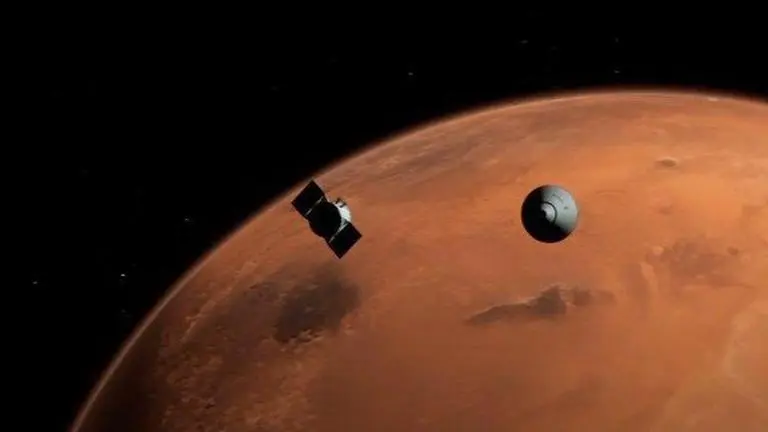Updated 19 July 2022 at 23:23 IST
Relativity Space partners with Impulse to beat Elon Musk's SpaceX in race to Mars
Relativity Space and Impulse Space Propulsion have partnered to launch a lander in the first-ever commercial mission beating SpaceX to Mars flight in 2024.
- Science News
- 2 min read

US-based private companies Relativity Space and Impulse Space Propulsion, Tuesday, announced their partnership to deliver the first payload on the surface of Mars in 2024. Under this collaboration, the two parties will aim to beat Elon Musk’s SpaceX in the race to the red planet this decade by launching the first-ever commercial interplanetary mission.
Today we’re excited to announce an exclusive partnership with @GoToImpulse to launch its Mars Cruise Vehicle & Mars Lander on Terran R, our fully reusable, entirely 3D printed rocket – delivering the first commercial payload to Mars’ surface pic.twitter.com/YoLwnyjTmG
— Relativity Space (@relativityspace) July 19, 2022
According to an official statement, Relativity Space will provide an entirely 3D-printed rocket Terran R, to deliver the payload developed by Impulse Space to Mars. This payload includes a Mars Cruise Vehicle and a Mars Lander, which will be launched inside the Terran rocket from Cape Canaveral, in Florida, under an agreement until 2029.
"This is a monumental challenge, but one that successfully achieved will expand the possibilities for human experience in our lifetime across two planets", Tim Ellis, co-founder and CEO of Relativity said in a statement. "With the delivery capabilities of Terran R coupled with Impulse’s in-space transportation, we are bringing humanity one step closer to making Mars a reality".
Relativity-Impulse share blueprint of the Mars mission
In a joint statement, the two companies shared the blueprint of their Mars mission which begins when the launch window opens in 2024. Following the liftoff from the Cape Canaveral Space Force Station, the Terran rocket would send Impulse's payload on a trans-Mars injection (TMI) orbit, and after completing its journey, the aeroshell-equipped Mars Lander would enter the red planet's atmosphere and execute a controlled and propulsive landing (explained in the video).
Advertisement
The statement revealed that Impulse’s Mars Lander will have its own payload capacity to the Martian surface, supporting the necessary research and development required to support future missions. Relativity claims that its 3D printing technology enables it to 'print' its rockets with 100x fewer parts in under 60 days.
Impulse Space CEO Tom Mueller, however, highlighted one challenge facing the mission. "One of the most challenging aspects of landing on Mars is the ‘glide stage,’ which involves an aeroshell to encapsulate the lander for the survival of Mars entry". Mueller, who is also the founder of Impulse, was one of the founding members of SpaceX, which has its own ambitious plans to colonise Mars. Time and again, Musk has reiterated his ambitious goals of sending the first batch of astronauts to Mars this decade, even stating that the best-case scenario is five years.
Advertisement
Published By : Harsh Vardhan
Published On: 19 July 2022 at 23:23 IST
